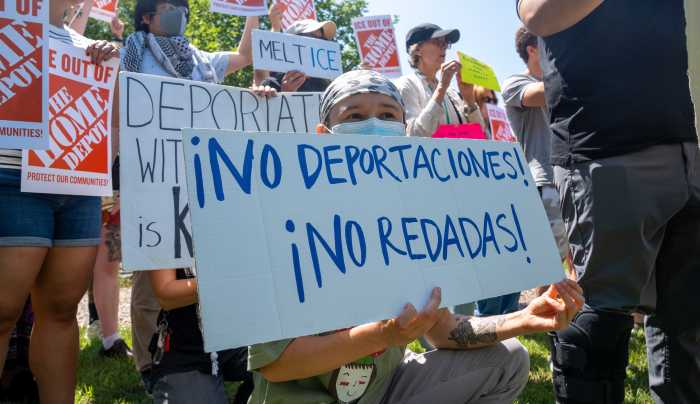
Back To The Future?
So what does Osama bin Laden’s death mean in the long run? Is it the body blow that will ultimately destroy al-Qaida? Or will his death simply galvanize his followers, give them a rallying point and cause them to follow their martyr’s call more fervently?
According to our region’s politicians, the jury’s still out. One thing’s absolutely certain, however:
“His death does not mark the end of our effort,” said President Obama. “There’s no doubt that al-Qaida will continue to pursue attacks against us. We must, and we will, remain vigilant at home and abroad. As we do, we must also reaffirm that the United States is not, and never will be, at war with Islam. Bin Laden was not a Muslim leader; he was a mass murderer of Muslims.”
New York City and Long Island remain the top target for international Islamic terrorists, reminds Rep. Peter King (R-Seaford), chairman of the Homeland Security Committee.
“In the short run, the concern for New York is that we are the No. 1 target in the world, and that if al-Qaida tries to avenge the killing, they will try it in New York or Long Island,” he warns.
It was a message King first stressed to the Press in an interview previewing his controversial March 10 hearing into the radicalization of American Muslims. Those hearings, he says, now have added importance in lieu of Osama bin Laden’s death—with the second hearing to be held next month, he adds.
“Al-Qaida will feel it has to retaliate,” he explains. “They have to. This is such a dramatic loss for them. We’re assuming they’re going to try another attack as soon as possible. It will be hard for them to do it from overseas because that usually takes them longer to get those attacks going. And so the concern is that it will be somebody here in the United States. Either a group that’s here, which will get their orders from overseas, or just a self-radicalized person.
“All the police departments in the area have ramped up their security, their surveillance,” King says. “I had a meeting with all the law enforcement agencies over the last few days. There’s no evidence of any plot that’s out there right now, but you wouldn’t see that anyway coming from a home-grown group because usually they are under the radar screen.
But everyone’s watching.”
Consequently, vigilance was on the lips of many a politico in the wake of bin Laden’s death. Vigilance in the face of potential retaliation.
“[NYPD] Commissioner [Ray] Kelly is taking increased measures to make sure that New York is kept safe, increasing the police presence on the subways and other areas around New York to make sure that if there were any retaliatory actions we were prepared,” U.S. Sen. Kirsten Gillibrand (D-NY) said May 3 on MSNBC’S The Morning Joe. “The reality is…that New York has had 12 terror attempts since 9/11.”
The last attack, she reminded viewers, was only averted when a street vendor noticed smoke billowing from an SUV loaded with explosives in crowded Times Square. That plot was the work of would-be bomber Faisal Shahzad.
“So we all have to remain vigilant,” she explained.
As King pointed out, Shahzad wasn’t the first attempt since 9/11, either: Najibullah Zazi was planning to launch a terrorist attack on the New York City subway system when he was arrested; his plot was only foiled after his name was picked up by wiretaps of two others under surveillance. Bryant Neal Vinas, a 26-year-old Long Islander who received bomb training from al-Qaida, plotted to blow up the Long Island Rail Road—the largest commuter railroad in the country.
“We cannot let up on this war on terrorism,” warned U.S. Sen. Charles Schumer (D-NY), in a response to the Press. “Bin Laden and his evil dogma have poisoned the minds of so many, and we have to keep going after them. But I think this gives us a leg up, both psychologically and militarily. Bin Laden is gone, his network could well crumble or start fighting with one another. Of course, there will be other terrorists and we can’t let up, but it gives us faith in our military and our intelligence and I think it gives the people of the world faith as well.
“I think many of the groups like al-Qaida are wounded, but the possibility of radicalized people creating damage is still real, so we must remain vigilant,” he adds.
“Bin Laden is dead, but al-Qaida is not,” says Rep. Carolyn McCarthy (D-Mineola). “I’ve always felt that New York will be a target. This is the place they would want to do it, just for the symbolism of it to the terrorists. We have to be vigilant.”
Politically, the added benefits for the president from being the one who finally got rid of bin Laden are apparent, says Nassau and state Democratic chairman Jay Jacobs.
“This helps national politics for President Obama on a variety of levels,” he tells the Press. “It is such a larger national patriotic event that it crosses party lines… For those who looked at President Obama as somebody they questioned his ability as commander in chief, this puts that to rest. The national security issue is put to rest for good in the Obama presidency both in terms of the outcome that he was able to deliver and the way that he made the decision and took the gutsy move to do it.”
McCarthy agrees.
“It’s a great testament to many different levels of government working together to bring bin Laden down, and I think that shows the American people that their tax dollars [spent] to keep this nation safe are extremely important,” she says. “As for the political landscape, we’ve still got to work on jobs. I still consider the economy fragile. Jobs are so important right now.”
Neither the death of Osama bin Laden, or a healthier economy, however, will bring back deceased New York City Firefighter John McNamara, the nearly 3,000 others who died in the Sept. 11 Terrorist Attacks, or the tens of thousands more who have died in the conflicts since then.
For Jenn McNamara, John’s spirit is always around—though she admits his spirit has been distant of late, and she wonders now if he has been in Pakistan these past few weeks, serving his country yet again, protecting and guiding the Navy SEALs who carried out the mission. Jenn says she will not celebrate the death of any man, no matter how evil—“a death is a death,” she says—but the circumstances of bin Laden’s death bring her some sense of closure.
“And to know that it was done by one of ours,” she says, “to know that it was hand-to-hand combat, [to know that] he was looking down the barrel of an American gun being held by an American soldier, and he knows that that’s what got him, and he knows that despite him saying ‘I’ll never be taken alive…,’ well guess what, baby? You were. You were taken, and you were taken down by an American. So, you know, eff you.”
This story was written and reported by Timothy Bolger, Lindsay Christ, Rashed Mian, Michael Patrick Nelson, Spencer Rumsey and Christopher Twarowski.


































